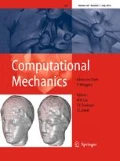Abstract
In this paper a new technique for a posteriori error control and adaptive mesh design is presented for finite element models in perfect plasticity. The approach is based on weighted a posteriori error estimates derived by duality arguments as proposed in Becker and Rannacher (1996) and Rannacher and Suttmeier (1997) for linear problems. The conventional strategies for mesh refinement in finite element methods are mostly based on a posteriori error estimates for the global energy norm in terms of local residuals of the computed solution. These estimates reflect the approximation properties of the trial functions by local interpolation constants while the stability property of the continuous model enters through a global coercivity constant. However, meshes generated on the basis of such global error estimates are not appropriate in computing local quantities as point values or contour integrals and in the case of nonlinear material behavior. More accurate and efficient error estimation can be achieved by using suitable weights which can be obtained numerically in the course of the refinement process from the solutions of linearized dual problems. This feed-back approach is developed here for primal-mixed finite element models in linear-elastic perfect plasticity.
Similar content being viewed by others
Author information
Authors and Affiliations
Rights and permissions
About this article
Cite this article
Rannacher, R., Suttmeier, FT. A posteriori error control in finite element methods via duality techniques: Application to perfect plasticity. Computational Mechanics 21, 123–133 (1998). https://doi.org/10.1007/s004660050288
Issue Date:
DOI: https://doi.org/10.1007/s004660050288




